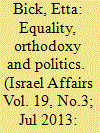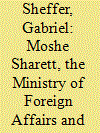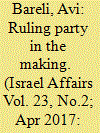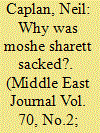| Srl | Item |
| 1 |
ID:
122068


|
|
|
|
|
| Publication |
2013.
|
| Summary/Abstract |
National service was a controversial issue in Israel in the early years of the state. A law requiring religious girls exempted from the military to do two years of mandatory civic service was passed in August 1953 and never implemented. This article examines the political controversy surrounding the adoption of the national service law and concludes that David Ben-Gurion advanced the law mainly for political reasons in order to counterbalance concessions made to the orthodox. Moreover, consistent with his mamlachtiyut (statist) philosophy, he was unwilling to consider any compromise proposals other than a mandatory government-run programme. Pressure from the religious parties caused his successor, Moshe Sharett, to concede on the implementation details, voiding the law of content. Subsequent governments acceded to orthodox demands to freeze the law. In 1971, a more pragmatic Labour government headed by Golda Meir instituted a programme of voluntary national service which provided needed manpower to the development towns and fulfilled the wish of girls from the religious Zionist sector to give service to the nation.
|
|
|
|
|
|
|
|
|
|
|
|
|
|
|
|
| 2 |
ID:
100744


|
|
|
|
|
| Publication |
2010.
|
| Summary/Abstract |
Many observers agree about the marginal position and involvement of the Ministry of Foreign Affairs (MFA) as well as all other ministries active in the sphere of Israeli-Jewish Diaspora relations, which is closely connected to Israeli governments' general positions and attitudes toward the Jewish Diaspora. The article examines the historical sources of this situation in the Israeli government. It discusses especially the role of the MFA, which, theoretically, should have been very closely involved in Israeli-Jewish Diaspora relations. It focuses mainly on the period from 1948 until the mid-1950s.
|
|
|
|
|
|
|
|
|
|
|
|
|
|
|
|
| 3 |
ID:
151814


|
|
|
|
|
| Summary/Abstract |
The article discusses the transformation of Mapai, the main political party in Israel’s pre-state years, into the ruling party of a sovereign state. By way of doing so Mapai went through three distinct stages, from striving to build a working class of rural and urban labourers, to seeking immediate statehood via rapid mass immigration and partition, to acting as an effective ruling party, or the ‘party of the state’ as it called itself, following the November 1947 UN partition resolution. It was in charge of creating the machinery of government during a time of war, and this fostered hierarchical patterns characteristic of a sovereign rule, notably the independence of the government vis-à-vis the political parties, including Mapai itself.
|
|
|
|
|
|
|
|
|
|
|
|
|
|
|
|
| 4 |
ID:
145048


|
|
|
|
|
| Summary/Abstract |
Drawing mainly on the diary of Israeli politician Moshe Sharett, this article examines the circumstances surrounding his forced resignation as foreign minister in 1956. It was Prime Minister David Ben-Gurion who insisted on Sharett’s removal but refused to reveal his reasons publicly. This examination of why Sharett was sacked also offers wider insight into conflicts between activism and restraint within Israel’s political and military elite in the lead-up to the Sinai War.
|
|
|
|
|
|
|
|
|
|
|
|
|
|
|
|